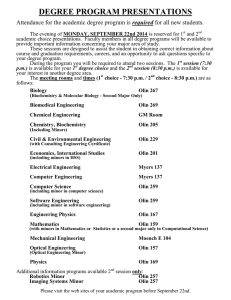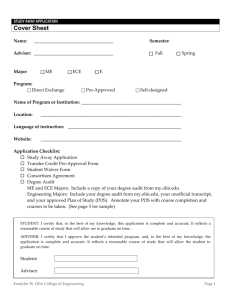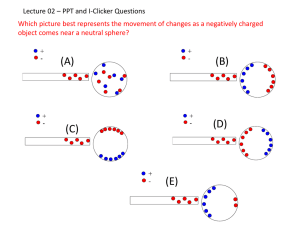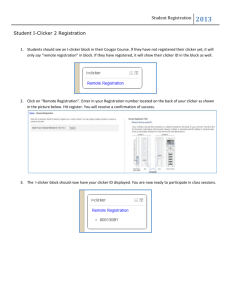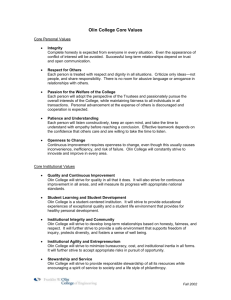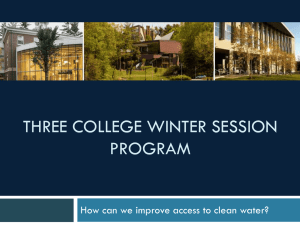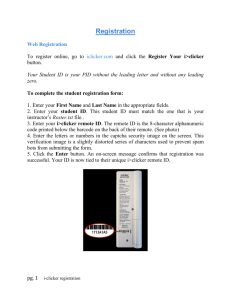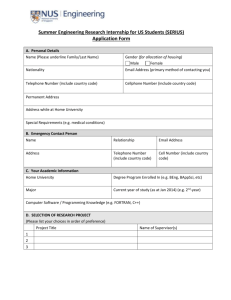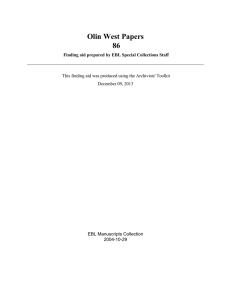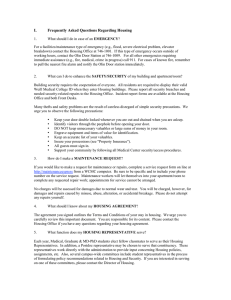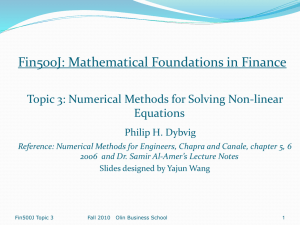Introduction and syllabus
advertisement
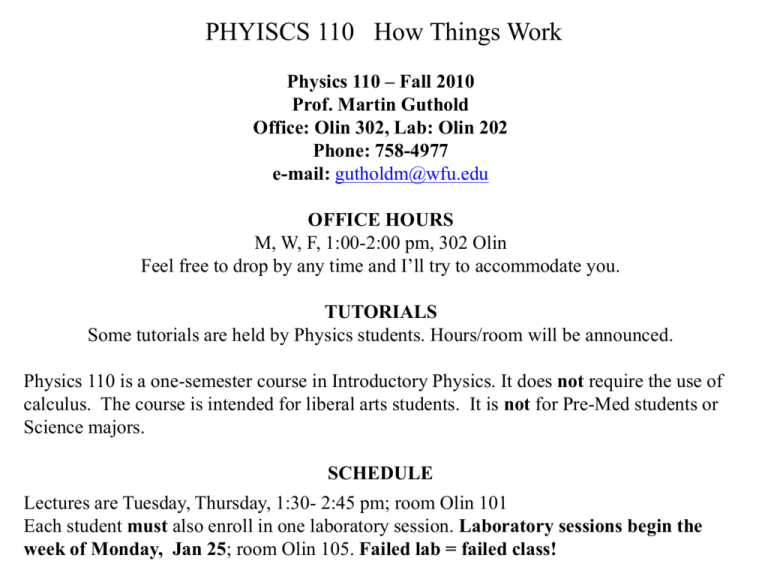
PHYISCS 110 How Things Work Physics 110 – Fall 2010 Prof. Martin Guthold Office: Olin 302, Lab: Olin 202 Phone: 758-4977 e-mail: gutholdm@wfu.edu OFFICE HOURS M, W, F, 1:00-2:00 pm, 302 Olin Feel free to drop by any time and I’ll try to accommodate you. TUTORIALS Some tutorials are held by Physics students. Hours/room will be announced. Physics 110 is a one-semester course in Introductory Physics. It does not require the use of calculus. The course is intended for liberal arts students. It is not for Pre-Med students or Science majors. SCHEDULE Lectures are Tuesday, Thursday, 1:30- 2:45 pm; room Olin 101 Each student must also enroll in one laboratory session. Laboratory sessions begin the week of Monday, Jan 25; room Olin 105. Failed lab = failed class! TEXT AND MATRIALS The text is the 4nd edition of How things work by Bloomfield (bookstore, or online). For the lab you must also obtain the lab manual in the bookstore (~ $15, bookstore). i-clicker (~ $ 30) EXAMS AND GRADING There will be one final exam and three 45 minutes midterm exams given at the dates listed below. Homework problems will be assigned for each chapter. The homework is due one week later in class. 1. Midterm exam 20% 2. Midterm exam 20% Final Exam 30 % Lab 15% Homework 10% i-clicker 5% (in-class multiple choice questions) attendance: 1 point correct answer: 1 point Exam dates & other important dates Last day to add class: Wednesday, Jan. 27 Last day to drop class: Wednesday, Feb. 17 Exam 1: Tuesday, Feb. 16 Exam 2: Tuesday, April 13 Final: Tuesday, May 4, 2:00 – 5:00 pm No lectures on: Tu & Th, March 9 & 11 (Spring break) HOMEWORK AND PROBLEM SOLVING Homework and problem solving is the most important part of learning in a course in physics. Approximately 15 questions or problems per chapter will be assigned as homework. Homework is due in class on due date. 80% grade if turned in by 5:00 pm on due date, 50% following two days. Some problems may also re-appear on the exams and the final. POSTINGS Lectures, homework, exam solutions, grades (listed by last four digits of student (ID), and other material relating to the course will be posted on the web site. http://www.wfu.edu/~gutholdm/Physics110/phy110.htm • • • • Try the Webpage at home. Download the lecture notes BEFORE class PRINT them out and BRING them to class. If you have problems, come and see me right away. Instructions on “How to print lecture notes (power point presentations)”: See hand-out. ATTENDANCE • In essence, attendance is taken via the i-clicker multiple choice questions (5% of the grade). Per i-clicker question: 1 point for attendance (any click) 1 point for correct answer • Attendance at the two exams and the final is required - absence will result in a zero grade unless an official excuse is presented. Excuses should be reported to me in advance. PHY110 TUTOR SESSIONS (Hours to come soon) MONDAY TUESDAY WEDNESDAY THURSDAY FRIDAY SUNDAY The tutor: Jillian Bjerke & Maggie Baldwin The tutor sessions in semesters past were very successful and received high marks from many students. All students are encouraged to take advantage of this opportunity. Tutor sessions will last one or two hours. Time/room to be announced. Private tutors are also available: see Judy Swicegood in department office (Olin 100) Homework graders: 1. Jillian Bjerke (room 311) 2. Colby Meador 3. Calli Nguyen Please contact the graders or me, if you have questions about the homework grading. Labs - The labs take place in Olin 105 - Lab manager: Eric Chapman (Olin 110), phone: 758-5532 - Your lab Teaching assistants (TAs): - Samrat Dutta, Ashley Carlton, Maggie Baldwin, Calli Nguyen, Jack Own, Zach Vance -Need to buy lab manual - Labs start week of Jan. 25. Lecture format: • Demos: Understand them & and take notes. (May pop up in exam) • Powerpoint presentations download them from http://www.wfu.edu/~gutholdm/Physics110/phy110.htm, print them out (e.g. three slides on a page) and bring to the lecture.) • Blackboard READ THE TEXT BOOK!!! Book review • The book takes everyday objects and looks at the “physical concepts ” behind them. • Shows that science is part of our everyday life. • Goals: • Begin to see the science in everyday life. • Learn that science isn’t frightening. • Learn to think logically in order to solve problems. • Develop and expand physical intuition. • Learn how things work. • Things don’t just occur willy-nilly. • Obtain perspective on history of science and technology. READ THE TEXT BOOK!!! Book review Each chapter has the following features: • Introduction: (principal theme + at home experiment + itinerary) • Each chapter is divided into a few sections • Each section: Check your understanding, figures answers at end of chapter • • • • Epilogue: connects studied objects and physical concepts Summary: summary + restatement of important laws and equations Exercises (explanations) Problems (numbers) • Glossary at the end of the book • Two appendices 1. Vectors; 2. Units Complementary information to the book can be found here: http://bcs.wiley.com/he-bcs/Books?action=index&itemId=0470223995&bcsId=4824 Click down from: www.wiley.com/college/bloomfield You can find review questions, physics concept summaries, additional material, exercises, problems, cases,… Things to check in at the door: 1. Group dynamics: Cynicism is cool Indifference Whatever attitude 2. Personal: I can’t do it. I don’t know where to start 3. Calculus Tentative Schedule Lecture Chapter No. 1 2 1.1 3 1.2 4 1.3 5 2.1 6 2.2 7 2.3 8 3.1 9 3.3 10 Tu, Feb. 16 12 5.1 13 7.1 14 7.2 Topic Introduction, The laws of motion, Part I, skating The laws of motion, Part I, falling balls The laws of Motion, Part I, ramps The laws of Motion, Part II, wind turbines The laws of Motion, Part II, wheels The laws of Motion, Part II, bumper car Mechanical Objects, Part I, spring scales Mechanical Objects, Part I, carousels and roller coasters review Midterm 1 (Ch. 1-3) fluids, balloons Heat and Phase Transitions, wood stoves Heat and Phase Transitions, water, steam and ice Tentative Schedule, cont. Day, Date Chapter No. 15 9.1 16 9.2 17 10.3 18 Tu, Apr. 16 18 11.1 19 11.2 Topic Resonance and Mechanical Waves; Clocks Resonance and Mechanical Waves; Musical Instruments Electricity, flashlights Review Midterm 2 (Ch. 5, 7, 8 - 11) Magnetism & Electrodynamics, household magnets Magnetism & Electrodynamics, electric power distribution 20 11.3 21 15.1 22 16.1 23 Tu, May 4 Magnetism & Electrodynamics, Hybrid Automobiles Optics, Cameras, lenses Modern Physics, Nuclear Weapons Review Final; 2:00 to 5:00 Homework: For next class: • Check out course web page and print out Chapter 1.2 • Buy book, lab manual, and i-clicker • Reading assignment: Chapters 1.1, 1.2
